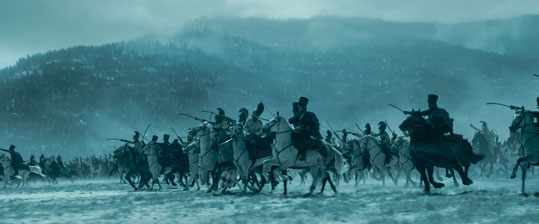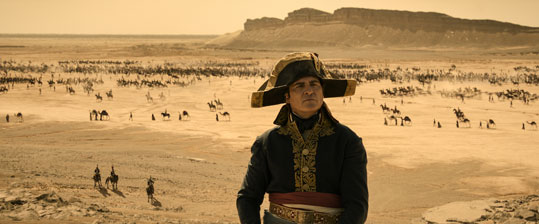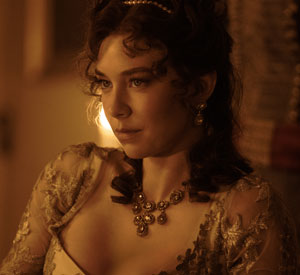Directed by Ridley Scott
By David Murphy
The arrival of this film has been much anticipated among Napoleon buffs and those who enjoy historical drama generally. At almost three hours long, it is epic in proportion and had a similarly epic budget; it is rumoured to have cost around $200 million to produce. For veteran director Ridley Scott this was a long-term project and originally had the working title Kitbag, based on the Napoleonic maxim that every soldier’s kitbag held a marshal’s baton. It stars Joaquin Phoenix as Napoleon with Vanessa Kirby as Josephine, and a large ensemble cast of well-known actors providing some excellent support.

Napoleon has all the hallmarks that we have come to expect from a Ridley Scott production. The period detail is excellent in terms of costumes, uniforms, weapons and even the use of popular songs of the period. He is a master of creating believable candlelit interior scenes, and his use of the Maltese islands as the location for several outdoor scenes is excellent, the well-preserved fortifications on the islands and the baroque architecture being used to full effect. Unlike many treatments of Napoleon, Scott also presents us with a cast of characters who are shown to have enabled his rise to power. Lucien Bonaparte is shown playing his part, along with figures such as Paul Barras, Talleyrand and Marshal Berthier, among many others.

There are, however, some significant historical issues with this film. It is presented to the audience as a series of vignettes: we see Napoleon at Toulan (1793), then Egypt (1798), then Austerlitz (1805) and so on. These are interspersed with scenes focusing on his troubled relationship with Josephine. The audience is provided with no explanation or contextual clues, and that allows space for major misconceptions to creep in. For example, there is a sequence on Napoleon’s invasion of Russia in 1812, which is actually very well done and illustrates Napoleon’s perplexity at the Russians’ burning of Moscow. The action then jumps to an interior scene, and we are shown the First Abdication of 1814. It would be easy to conclude that the abdication came directly after the Russian disaster and no reference is made to the campaigns of 1813 and 1814, during which Napoleon was often at his best as a battlefield commander.
The central theme of the story told here is the relationship between Napoleon and Josephine, and this ultimately does a disservice to the film. Indeed, it leads to further misconceptions. For example, during the sequence focusing on Napoleon’s invasion of Egypt, we see him being told that Josephine was having an affair and he then decides to return to France. In reality, he left Egypt owing to strategic and political considerations. The French navy had been destroyed in a series of actions in the Mediterranean and he could no longer resupply nor evacuate his army. There was also political turmoil and opportunity in Paris. There is no discussion of these elements or the fact that he deserted his army, which later had to surrender en masse. Similarly, when he escapes from Elba in 1815 for the Waterloo campaign, it is suggested that returning to Josephine is the key motivation. The relationship between Napoleon and Josephine was indeed significant and quite dysfunctional, and excerpts of surviving letters are read into the film’s narrative. Scott seems to have taken these at face value and does not seem to have considered their sincerity. In historical reality, both parties were serially unfaithful to each other, and Napoleon’s casual, if not cynical, attitude to women is well documented.

Regarding the performances, Joaquin Phoenix presents us with a Napoleon who is mostly glum and unemotional. Was Phoenix afraid that if he brought more emotion to the role he would be accused of ‘scenery-chewing’? Napoleon was an emotional creature, but we see little of the charm, charisma, explosive anger and leadership steel for which he was renowned. There are glimpses of this in the scenes focusing on Austerlitz, the Treaty of Tilsit and Waterloo, but we are presented with a largely uninspiring Napoleon. The audience might well be left wondering why so many soldiers, and the population of France, followed this man for so long.
There are other smaller issues, and these could be, and probably will be, dismissed as ‘rivet-counting’ by Ridley Scott. For example, there are too many French and British flags flying in army camps and, at Waterloo, we are shown a British rifleman targeting Napoleon with a rifle that has a telescopic sight. Such scopes first appear on military rifles during the American Civil War in the 1860s, while the British army did not use them until the First World War, a century after Waterloo—a small point but indicative of wider historical carelessness. During the scenes of the battles of Borodino (1812) and Waterloo (1815), we are presented with Napoleon leading a cavalry charge into the heart of the enemy formation. Nonsense—this simply never happened! At Waterloo, if anything, the most notable aspect of Napoleon’s performance on the day was his detachment at crucial stages of the battle.
The team of historical advisers cited in the end credits includes Michael Broers. Broers has written a very creditable two-volume biography of Napoleon, which makes all of these historical ‘howlers’ even more puzzling. Fans of Ridley Scott may remember that his début feature film, The Duellists (1977), also focused on a Napoleonic theme and was beautifully crafted, indicating both a love of the period and close attention to detail. The two films are many miles apart.
As Napoleon came to preview screenings in late 2023 there were initial reviews that were less than positive, and these met with a tetchy response from Scott. Ultimately, one has to wonder why a straight and historically accurate telling of Napoleon’s life was not deemed sufficient. His life was full of emotion, drama, ambition, violence and human frailty. The story does not need additions nor to be manipulated. There was huge potential here but the tendency to treat history as some putty-like substance, to be shaped into a director’s reimagining of Napoleon’s story, did not result in an effective or even enjoyable biopic.
David Murphy is a lecturer in the Department of History, Maynooth University.
